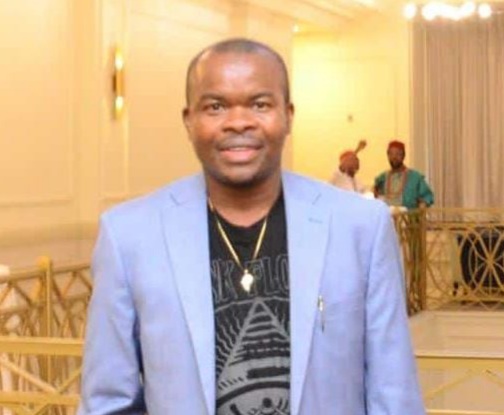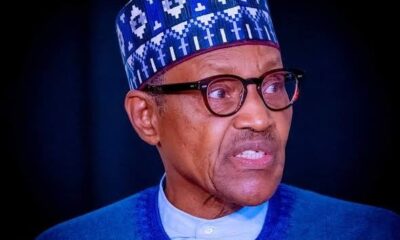Analysis
Now That Tinubu Has Listened … by Alabidun Shuaib AbdulRahman

Now That Tinubu Has Listened … by Alabidun Shuaib AbdulRahman
When President Bola Ahmed Tinubu announced, earlier in October 2025, that 175 individuals had been granted state pardon, clemency, or commutation of sentences, the news was framed as an act of justice, compassion, and correction. It was meant to mark a milestone in the President’s promise of a “renewed hope” administration, one that tempers justice with mercy, and offers a second chance to the reformed.
But in the days that followed, that noble gesture swiftly morphed into a national debate. The backlash was intense, the criticisms unrelenting, and the public mood unmistakably angry. What began as a constitutional exercise soon appeared, to many Nigerians, as a moral misjudgment. And by the end of October, the President was forced to reverse parts of the decision, trimming the list, clarifying the scope, and pledging a review of the process.
Now that Tinubu has listened, the question that must be asked is: What has he really done? And more importantly, what has the entire episode revealed about power, public trust, and governance in Nigeria?
Interestingly, the presidential clemency, announced on October 12, came through the Ministry of Justice and covered 175 individuals across various categories, including pardons, commutations, and reprieves. The list, compiled by the Presidential Advisory Committee on the Prerogative of Mercy (PACPM), included a mix of convicts serving jail terms for drug trafficking, illegal mining, fraud, and violent crimes, alongside some posthumous pardons for historical figures such as nationalist Sir Herbert Macaulay and military officer Major-General Mamman Jiya Vatsa.
The official statement from the Presidency said the exercise aimed to “decongest correctional facilities and promote restorative justice,” in line with Section 175 of the 1999 Constitution. It added that the beneficiaries were selected after “due consideration of factors such as age, ill health, good conduct, and evidence of reformation.”
But almost immediately, Nigerians began to ask: Who decides what qualifies as reformation? Were victims consulted? And how do you justify extending clemency to persons convicted of drug-related and violent crimes in a country still reeling under the weight of insecurity, substance abuse, and moral decline?
Social media erupted in outrage. Civil society groups issued statements condemning the exercise as tone-deaf and insensitive. Legal experts questioned the criteria used. Families of victims expressed disbelief that individuals convicted of offences like armed robbery and homicide could be released or have their sentences reduced without public consultation. The backlash was swift and brutal.
In a nation, moral-wise, already struggling with eroded trust in institutions, Tinubu’s clemency decision struck a nerve. Critics argued that mercy, though constitutional, must not be exercised in a way that undermines justice or public confidence.
For many Nigerians, the pardon list symbolised the very thing they feared about governance, a system that protects the powerful while ignoring victims.
Several high-profile inclusions stirred the controversy. Among those initially listed were convicts serving long sentences for drug trafficking, one for cocaine importation, and another for illegal mining, crimes that continue to destabilise communities and the economy. The perception was that Tinubu’s clemency ignored the gravity of the offences and the broader social harm they caused.
Public intellectuals and editorial boards joined the fray. The Punch editorial of October 24th described the move as “reckless leniency,” arguing that it “trivialises justice and weakens deterrence.” Others accused the government of seeking cheap populism through arbitrary mercy.
Facing a public rage, President Tinubu’s team scrambled to regain control of the narrative. On October 29, just over two weeks after the initial announcement, the Presidency issued a revised statement.
The revised list, according to The Cable and Channels TV, was trimmed from 175 names to about 120. Persons convicted of serious crimes, including kidnapping, armed robbery, human trafficking, large-scale drug trafficking, and unlawful possession of firearms were either removed entirely or had their full pardons converted into partial sentence reductions.
The Presidency clarified that the revision followed “a fresh security and legal review” by the Attorney-General of the Federation and that the decision was taken “to be sensitive to the feelings of victims and society at large.”
It was also announced that the Secretariat of the Presidential Advisory Committee on the Prerogative of Mercy would henceforth operate under the Federal Ministry of Justice, rather than the Office of the Secretary to the Government of the Federation, to ensure “greater legal oversight and due process.”
While the reversal calmed the outrage, it raised deeper questions about the integrity of governance processes. How did such a controversial list pass through layers of bureaucratic scrutiny before reaching the President’s desk? And why did it take public uproar for corrections to be made? Tinubu’s reversal, though commendable, underscored a reactive style of governance that bends to outrage rather than pre-empting it through consultation and moral foresight.
In fairness, listening to public sentiment is not weakness, it is a democratic strength. Tinubu deserves credit for acknowledging the outcry and acting promptly. But the larger issue is systemic. The episode exposed the opaque nature of Nigeria’s clemency system. The Presidential Advisory Committee on the Prerogative of Mercy operates largely behind closed doors, with minimal public oversight. There is no clear national framework defining who qualifies for mercy, how victims’ perspectives are integrated, or what accountability measures follow a pardon.
In contrast, countries like South Africa, Ghana, and Kenya have more transparent systems. In South Africa, for instance, clemency applications are published publicly, judicial advice is sought, and reasons for each decision are documented. These procedures protect both the President and the public from perceptions of bias or impunity. Nigeria lacks such guardrails, leaving presidential mercy vulnerable to political manipulation or poor judgment.
If Tinubu truly wishes to turn this episode into a learning moment, the next step must be institutional reform. A National Clemency Policy should be developed under the Ministry of Justice, detailing eligibility criteria, consultation procedures, and exclusions. Certain crimes such as terrorism, kidnapping, rape, large-scale corruption, murder, drug-trafficking and violent offences should be explicitly barred from pardon. Victims’ rights should also be central to the process, ensuring that their pain is neither ignored nor overridden by political convenience.
Moreover, post-pardon monitoring should be introduced to ensure that beneficiaries truly reintegrate into society as reformed citizens. Without such mechanisms, clemency risks becoming a revolving door for repeat offenders, weakening public trust and emboldening criminality. Mercy, when detached from accountability, is indistinguishable from impunity.
The deeper implication of Tinubu’s reversal lies in what it says about public trust. Nigerians are weary of governance that appears tone-deaf to moral and social realities. Every decision that seems to favour the powerful or the undeserving erodes faith in the system. For years, citizens have watched politicians, officials, and well-connected individuals escape justice through legal technicalities or political cover. The clemency controversy reopened old wounds, reminding many of a recurring theme: that justice in Nigeria is too often a privilege, not a right.
Tinubu’s decision to review the list, therefore, must mark more than damage control; it must signal a renewed commitment to principled governance. Listening is good, but leading is better. A president should not have to wait for outrage to do what is right. Leadership demands foresight, the moral clarity to anticipate public reaction and align decisions with the nation’s conscience.
The lesson from this controversy is clear. Mercy, when rightly exercised, strengthens justice; but when misused, it trivialises it. The prerogative of mercy was never meant to serve as a political tool or public relations gesture. It exists to balance the scales of justice when the law, in its rigidity, risks losing its humanity. For it to achieve that noble purpose, it must be guided by transparency, fairness, and integrity.
Now that Tinubu has listened, he stands at a crossroads. He can either let this controversy fade as another episode in Nigeria’s long history of public uproar and government retreat, or he can seize it as a turning point, one that ushers in a more accountable, morally grounded system of justice. The path he chooses will define not just his presidency but also the moral tone of governance in the years to come.
The clemency debate, at its core, was never about law alone. It was about values, about what kind of country Nigeria wants to be: one that prioritises compassion with conscience or one that mistakes pardon for weakness. The President’s reversal was necessary, but the journey toward reform has only just begun. Nigerians have spoken; Tinubu has listened. The next challenge is to act not for applause, but for posterity.
Alabidun is the Editor of Diaspora Watch Newspapers and can be reached via alabidungoldenson@gmail.com
Analysis
Abroad and the Mirage of Greener Pastures, by Alabidun Shuaib AbdulRahman

Abroad and the Mirage of Greener Pastures, by Alabidun Shuaib AbdulRahman
For many Nigerians, the idea of leaving the country in search of greener pastures has evolved from a personal aspiration into a collective obsession. It is discussed in living rooms, amplified on social media and often framed as the ultimate proof of success. Yet, beneath this powerful narrative lies a far more complex and troubling reality. The migration journey of many Nigerians abroad has increasingly become a cycle defined by delusion, deportation and depression, exposing not only the personal costs of mass emigration but also the structural failures that continue to make Nigeria unattractive to its own citizens.
The delusion begins with the belief that crossing Nigeria’s borders is a guaranteed escape from hardship. Economic instability, high youth unemployment, currency depreciation, insecurity and declining public services have made life at home feel suffocating for many. According to national labour data in recent years, millions of young Nigerians remain unemployed or underemployed, surviving on informal work with little security. In such an environment, the stories of Nigerians “making it” abroad often exaggerated and selectively told. Social media reinforces this illusion, projecting curated images of success while concealing years of struggle, legal uncertainty and social isolation. Migration, therefore, becomes less a carefully planned economic decision and more a desperate gamble.
What is often ignored is the reality that destination countries are no longer welcoming in the way they once were. Immigration systems across Europe, North America and parts of the Middle East have grown increasingly restrictive over the last decade. Entry visas are harder to obtain, asylum thresholds are higher, and undocumented migrants face swift enforcement. Many Nigerians, unable to meet legal migration requirements, resort to irregular pathways that expose them to exploitation, detention and eventual removal. The assumption that “once you enter, you will settle” has become one of the most dangerous myths fuelling migration today.
Deportation figures over the last five years reveal the scale of this problem. Between 2019 and 2024, official records from the United States Immigration and Customs Enforcement show that 902 Nigerians were deported from the U.S. alone. This made Nigeria the African country with the highest number of deportations from the United States within that period. The numbers fluctuated yearly with a peak in 2019 and renewed increases after the COVID-19 slowdown but the trend remained consistent: Nigerians continued to rank among the most deported African nationals. As of late 2024, over 3,600 Nigerians were still listed on active deportation dockets in the U.S., meaning thousands more face the possibility of forced return.
These figures only tell part of the story. Deportations from the United States represent a fraction of global removals. Nigerians have also been deported from the United Kingdom, Canada, Germany, Turkey and several Gulf countries, particularly the United Arab Emirates. While comprehensive global figures are difficult to aggregate due to varying reporting standards, Nigerian government confirmations and international media reports indicate that hundreds are returned annually from Europe and the Middle East for visa violations, overstaying, or irregular entry. In some cases, deportations occur quietly through “voluntary returns” under pressure, masking the true scale of the problem.
Deportation is not just a bureaucratic process; it is a traumatic human experience. Many deportees return with nothing but the clothes they wore during detention. Savings are wiped out, families are embarrassed, and years of effort collapse overnight. For those who borrowed money or sold property to finance migration, the consequences can be catastrophic. The psychological impact is severe. Depression, anxiety and a sense of personal failure are common among returnees, yet Nigeria’s mental health infrastructure remains ill-equipped to support them. In a society where success is often measured by foreign residence, deportation carries a stigma that deepens isolation and despair.
This emotional toll is worsened by the reality that many deportees return to the same economic conditions that pushed them out in the first place, sometimes worse. Without reintegration support or job opportunities, some struggle to rebuild their lives. Others attempt to migrate again, repeating the cycle. What emerges is not a story of adventure or progress, but one of circular displacement, with human lives caught between hope and rejection.
The uncomfortable truth is that migration itself is not the problem. People have always moved in search of better opportunities. The problem arises when migration becomes a mass escape route driven by structural neglect at home rather than opportunity abroad. Countries whose citizens show little desire to emigrate offer valuable lessons. Japan, for example, consistently records one of the lowest emigration rates in the world, with just over one percent of its population living abroad. This is not because Japanese citizens lack the means to travel, but because living standards, job security, healthcare, infrastructure and social cohesion make staying attractive. The same applies to countries like Finland and Denmark, where strong welfare systems, transparent governance and inclusive economic policies reduce the push factors that drive mass migration.
The United Arab Emirates presents another instructive case. Despite being one of the world’s largest migrant-receiving countries, over 99 percent of Emirati citizens choose to live at home. This reflects deliberate state investment in citizen welfare, education, housing and employment. Development in these countries did not happen by accident; it was the product of long-term planning, institutional discipline and a shared national vision that prioritised citizen wellbeing.
Nigeria’s situation stands in sharp contrast. The country has the human capital, natural resources and entrepreneurial energy to offer its citizens fulfilling lives at home, yet governance failures continue to erode trust in the system. Infrastructure deficits increase the cost of doing business, insecurity discourages investment, and inconsistent policies undermine long-term planning. As long as these conditions persist, foreign lands will continue to appear attractive even when evidence shows that the odds of success are increasingly slim.
What makes the situation more tragic is that the Nigerian diaspora itself is proof of what Nigerians can achieve under functional systems. Nigerians abroad excel in medicine, technology, academia, sports and business, contributing billions of dollars annually in remittances. These successes, however, highlight a painful paradox: Nigerians thrive elsewhere not because they are better suited to foreign environments, but because those environments reward talent, hard work and innovation more consistently.
The fixation on leaving Nigeria has also created a dangerous moral hazard. When migration becomes the default solution, pressure on leaders to fix systemic problems weakens. Citizens disengage, hoping to exit rather than reform. This mindset erodes national solidarity and undermines the collective responsibility required for development. No country has ever developed sustainably through mass emigration of its most productive population.
Reversing this trend requires more than slogans about patriotism. It demands credible action. Economic policies must translate into real jobs, not just growth figures. Education must align with labour market needs, equipping young people with skills relevant to a modern economy. Security must be restored so that lives and investments are protected. Institutions must function predictably so citizens can plan their futures with confidence. Without these, calls for Nigerians to “believe in the country” will ring hollow.
Equally important is honest public conversation about migration. Young Nigerians deserve accurate information about the risks, legal realities and psychological costs of irregular migration. Romanticising life abroad while ignoring deportation statistics and mental health consequences does a disservice to an already vulnerable population. Migration should be a choice made from strength, not desperation.
Analysis
Understanding Nigeria’s Tax Reforms from the Diaspora Lens, by Boniface Ihiasota

Understanding Nigeria’s Tax Reforms from the Diaspora Lens, by Boniface Ihiasota
Over the past year, Nigeria’s fiscal landscape has undergone one of its most significant overhauls in decades. With the Nigeria Tax Act (NTA) 2025, Nigeria Tax Administration Act (NTAA) 2025, Nigeria Revenue Service (Establishment) Act (NRSEA) 2025, and the Joint Revenue Board (Establishment) Act (JRBEA) 2025 all gazetted and taking effect from January 2026, Nigerians both at home and abroad have stirred in intense debate about what the new tax regime means for them.
For Nigerians in the diaspora, often seen as economic anchors through remittances, investment, skills, and global network strengths, the anxieties have been palpable. But beneath the political rhetoric and social media speculation lies a set of rational, fact-based realities that deserve sober reflection.
At the heart of the concerns was a simple question: Will Nigerians abroad now be taxed simply because they are citizens, earn income abroad, or send money home? The answer, based on official clarifications from the government’s Presidential Fiscal Policy and Tax Reforms Committee, is a resounding no — provided certain conditions are met.
Under the new tax framework, tax liability is tied to residency and source of income, not nationality. Nigeria uses the widely accepted 183-day rule to determine tax residency: an individual who spends 183 days or more in Nigeria within any 12-month period is treated as a tax resident and may be liable to tax on their worldwide income. A Nigerian living predominantly overseas is therefore generally classified as a non-resident for tax purposes.
For non-residents, the guiding principle is simple: only income derived from Nigerian sources such as business profits within Nigeria, rental income from Nigerian property, dividends from Nigerian companies, or other Nigeria-sourced earnings is taxable in Nigeria. Income earned entirely abroad, even if remitted into Nigeria, is not taxable under the new law.
This principle aligns with international norms and double taxation prevention practices, ensuring that non-residents are not taxed twice on the same earnings. Nigeria has signed Double Taxation Agreements (DTAs) with many countries to further cement this protection, and in cases where no treaty exists, unilateral relief provisions now apply.
Perhaps the most emotionally charged topic for families across Nigeria and its global diaspora has been remittances, the lifeblood of many households and a key stabilizer of local economies. According to reports from the International Organization for Migration and other development institutions, Nigeria received over $20 billion in remittances in 2024 alone, making it one of the largest recipients globally.
The good news for diaspora Nigerians is that personal remittances, family transfers, gifts, refunds, and community contributions are explicitly not treated as taxable income under the new laws. They fall outside the definition of income because no services were rendered in exchange, meaning such inflows do not attract income tax.
This clarification is huge symbolically and economically. It stabilizes diaspora-to-home financial support channels and removes the fear that sending money to loved ones could attract punitive tax liabilities.
One point of confusion early in the rollout of the tax reforms was whether diaspora Nigerians were required to obtain a Tax Identification Number (TIN) or file annual returns. The government has clarified that Nigerians abroad who do not earn Nigerian-sourced income are not required to get a TIN or file returns simply by virtue of being diaspora citizens.
A TIN becomes relevant only when an individual earns income that is subject to Nigerian tax — for example, if they operate a business in Nigeria, receive Nigerian rents or dividends, or are otherwise engaged in Nigerian economic activities. In such cases, the government has made compliance simpler through digital platforms like TaxProMax, enabling remote TIN registration and electronic filing.
Under the new regime, pensions or stipends from abroad are not taxed in Nigeria unless they relate to employment performed in Nigeria. Similarly, income earned by remote workers employed by foreign entities is taxed in the country where the work is performed or where the worker resides, not in Nigeria.
Investment income like dividends, rental profits from property in Nigeria, or capital gains can be taxable, but they are subject to specific exemptions, withholding tax rates, and treaty-based withholding reductions, depending on the country of residence and the nature of the income.
For many Nigerians living abroad, these tax clarifications provide both relief and opportunity. They remove the threat of arbitrary taxation on diaspora earnings and remittances, uphold the principle that tax should be fair, linked to economic presence and source of income, and provide clear rules on compliance and obligations. This clarity could encourage greater diaspora engagement in investment, return visits, knowledge transfer, and even relocation — all of which can contribute to national development.
However, the reforms also underscore the importance of understanding one’s tax status, especially for diaspora members who maintain business interests, property, or other income-generating activities in Nigeria. In such cases, proactive compliance and professional tax guidance remain vital.
In conclusion, while tax changes can stir anxiety, the new framework ultimately protects the financial interests of Nigerians abroad, aligns Nigeria with global tax practices, and provides a structure that facilitates, rather than inhibits, diaspora contributions to national progress.
Analysis
Are Forest Guards to the Rescue? By Alabidun Shuaib AbdulRahman

Are Forest Guards to the Rescue? By Alabidun Shuaib AbdulRahman
Nigeria’s insecurity story has become the longest‑running drama of our national life, and, at times, its most tragic one. Every week seems to bring another report of village raids, kidnappings, forest‑based ambushes or displaced families seeking refuge from bandits and terrorists. City centres barely register the scale of fear that grips the rural hinterland, where the reach of the state has, for years, thinned to near invisibility. In this context, one of the most talked‑about security interventions of 2025 has been the launch of Forest Guards, a new security force aimed at reclaiming Nigeria’s forest reserves from criminal exploitation. But the fundamental question remains: Is this initiative truly to the rescue?
On May 15, 2025, President Bola Ahmed Tinubu approved the establishment of a national Forest Guards system as part of broad efforts to curb escalating insecurity across Nigeria. The announcement, made at an expanded Federal Executive Council meeting, envisaged recruiting as many as 130,000 forest guards nationwide by directing each state and the Federal Capital Territory to hire between 2,000 and 5,000 operatives depending on their financial capacity. The recruitment and training process was to be jointly supervised by the Office of the National Security Adviser (ONSA) and the Ministry of Environment, with other arms of government providing strategic partnerships.
Nigeria has 1,129 recognised forest reserves and protected areas spread across 36 states and the FCT, making it one of the countries with extensive forest cover on the continent. Many of these forests have become havens for bandits, terrorist groups and kidnappers who exploit the terrain’s complexity to evade the reach of conventional security forces. The initiative’s core premise is to deny these criminals the luxury of sanctuary and operational space by placing trained personnel directly within the forests and surrounding communities.
The launch was greeted with a blend of cautious optimism and scepticism. On one hand, the idea of forest‑specific security adherents — indigenous recruits familiar with local terrain — promised something more nuanced than the traditional military incursions that have repeatedly failed to sustain security gains. On the other hand, concerns about resourcing, coordination, recruitment delays and the overall viability of such a large force in a tilted fiscal climate began to surface almost immediately after the announcement.
Seven months after the launch, the first cohort of Forest Guards has begun to take shape. On December 27, 2025, over 7,000 newly trained Forest Guards graduated from an intensive three‑month training programme under the Presidential Forest Guards Initiative. The graduates emerged from exercises held simultaneously across seven frontline states — Borno, Sokoto, Yobe, Adamawa, Niger, Kwara and Kebbi — marking what many officials described as the operational takeoff of the project. These states were selected partly because they include forest corridors most closely linked to violent criminal activity.
At the graduation ceremonies, National Security Adviser Mallam Nuhu Ribadu outlined the initiative’s purpose: to “strengthen Nigeria’s internal security architecture by denying terrorists, bandits, kidnappers and other criminal groups sanctuary within forested and hard‑to‑reach terrains,” and to serve as “first responders, gather intelligence and support security agencies operating in forests and difficult terrain.” According to Ribadu, deployment would begin immediately, with salaries and allowances to commence without delay.
The guards were trained not simply in physical endurance and patrol discipline, but in human rights, international humanitarian law, ethics and civilian protection. This curriculum including arms handling and regulated use‑of‑force procedures was deliberately structured to ensure that the guards would operate professionally and within established legal frameworks.
Yet seven months after the presidential approval, not all states have fully embraced the initiative. As at last count, the recruitment efforts vary widely: while states like Borno, Adamawa, Kwara, Plateau, Niger, Edo, Anambra and Enugu have begun processes, others such as Kaduna, Ondo, Benue, Kano, Jigawa, Akwa Ibom and Gombe lag behind in recruitment and mobilisation. It was argued that without universal adoption and consistent funding, the force risks patchy coverage that does little to alter the country’s broader insecurity picture.
Still, the fact that thousands of guards are now equipped, trained and being dispatched to forest zones represents a symbolic break from past half‑measures. It reflects a growing consensus among policymakers and security strategists that conventional military responses, often reactive and episodic, must be complemented by specialised, sustained presence in the spaces where criminal networks thrive.
Nigeria’s approach echoes similar strategies elsewhere in the world, albeit adapted to local contexts. In southern Africa, anti‑poaching ranger units have shown that continuous, well‑trained presence in protected areas can significantly reduce illegal activity; documented declines in poaching and encroachment followed sustained ranger deployments in conservation zones. While Nigeria’s Forest Guards are focused on insecurity rather than wildlife protection, the operational logic is similar: constant presence alters the behavioural calculus of those who operate outside the law.
In India’s forested insurgency zones, forest guards working alongside conventional security forces have helped limit mobility and operational space for insurgent groups. The collaborative model, combining local knowledge, community engagement, and formal security mandates has been credited with improving early warning and preventive capacity in areas where terrain favours non‑state actors.
China, despite its very different political environment, has deployed millions of forest rangers nationwide to enforce laws and protect resources, underlying the broader principle that unmonitored terrain invites exploitation.
These international parallels suggest that a specialised force rooted in terrain familiarity and community engagement can yield positive results. But it also posits the prerequisites for such success: adequate resourcing, clear legal authority, accountability, consistent funding, and structures that prevent politicisation or fragmentation. Nigeria’s Forest Guards may be a promising model, but without these underpinning elements, they risk becoming another iteration of well‑meaning policy that struggles under real‑world pressures.
For rural communities long left to fend for themselves, the presence of Forest Guards is welcome. Anyone who has seen a village terrorised for weeks can attest to the psychological value of a sustained security presence. But analysts caution that security alone cannot provide a durable solution. Poverty, unemployment, weak local governance and distrust of the state remain powerful drivers of criminal recruitment and persistence. Unless Forest Guards are integrated into broader development strategies including livelihood support and meaningful local governance their impact may be limited to temporary disruptions rather than lasting peace.
Another dimension of the Forest Guards debate revolves around accountability and professionalism. Nigeria’s history with auxiliary forces and special initiatives has been mixed, with some units overstepping mandates or becoming politicised over time. For Forest Guards to be credible, they must operate transparently, with accountability mechanisms that reassure citizens and protect human rights. This is especially important in forest communities where distrust of security agents sometimes runs deep.
Effectiveness must also be measured, not assumed. Public discourse often gravitates toward dramatic figures and proclamations, but the real test will be quantifiable outcomes: reductions in forest‑based kidnappings, dismantling of criminal encampments, improved safety on rural routes, and greater confidence among farmers and traders in returning to their lands. Nigeria’s security sector has sometimes been weak on data‑driven evaluations, but if Forest Guards are to transcend rhetoric, clear metrics and regular reporting will be indispensable.
Sustainability remains the overbearing question. Maintaining a specialised force of potentially 130,000 personnel that is well trained, paid, monitored, and accountable requires serious budgetary commitment. Nigeria’s economy is under strain, and security spending already commands a significant share of public finances. Ensuring that Forest Guards do not become victims of fiscal neglect will require sustained political will that goes beyond headline launches.
Yet, even with these caveats, the emotion in many affected communities is unmistakable: cautious hope. For farmers whose fields have been overrun, for traders who abandoned routes for fear of kidnappers, and for families rebuilding after raids, the idea that state presence could transform once‑feared forests into safer spaces matters deeply. It may not be the single panacea for all forms of insecurity, but it is an acknowledgment that Nigeria’s security challenges demand innovative and context‑specific solutions.
Ultimately, whether Forest Guards are truly “to the rescue” will depend on actions taken in the months and years ahead, not only on the ground but in corridors of policy, budgeting and public accountability. The forests have waited long enough for effective governance; now, the state’s ability to sustain this initiative may be one of the defining tests of its commitment to protecting every Nigerian, not just those in urban centres.
Nigeria’s insecurity did not emerge overnight, and it will not vanish overnight. Forest Guards represent an important step toward recognising that the battle for peace includes the spaces that have long been ignored. If properly resourced, professionally guided, and integrated with broader security and socio‑economic frameworks, they may yet prove to be not just a policy experiment, but a genuine rescue for communities long overshadowed by fear.
-

 Analysis4 days ago
Analysis4 days agoAbroad and the Mirage of Greener Pastures, by Alabidun Shuaib AbdulRahman
-

 News4 days ago
News4 days agoHow US Captured Venezuela’s President Maduro in Daring Overnight Raid
-

 News4 days ago
News4 days agoUS Denies War With Venezuela as Tensions Rise After Maduro’s Capture
-

 News4 days ago
News4 days ago40 Dead, 119 Injured in Swiss Ski Resort Bar Fire
-

 Business4 days ago
Business4 days agoTesla Loses Top Spot as BYD Overtakes in Global EV Sales
-

 Analysis4 days ago
Analysis4 days agoUnderstanding Nigeria’s Tax Reforms from the Diaspora Lens, by Boniface Ihiasota




















